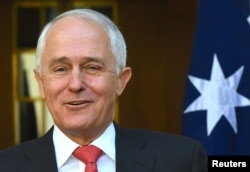Australia is planning to bring in tougher English language tests for migrants and new citizens. The center-right government says too many settlers do not speak English well enough to integrate into Australian society, while critics argue the changes are discriminatory.
Australia’s first citizenship ceremony was held in 1949. Since then millions of migrants have pledged their loyalty to their adopted homeland.
But the government says census figures indicate about one million people in Australia — or about four percent of the population — do not speak English or have the basic skills to understand the national language.
New laws to administer tough English exams for migrants failed to pass parliament last October, but Prime Minister Malcolm Turnbull is reviving the plan.
“The key to successful integration into the Australian community, to economic success, to every success, social success is being able to speak English,” he said.
For more than a decade new citizens have had to pass a general knowledge test about Australia’s people, its democratic traditions and institutions.
The Minister for Citizenship and Multicultural Affairs, Alan Tudge, says a more stringent language exam is needed.
“One of the more important things there I do think is English language," he said. "And we need to ensure for the interests of the migrant as much as for social cohesion, that there is that common language across the community, that common glue which is so vital for social cohesion. The great Australian multicultural success story which has been built on integration, not on assimilation, where you have to give up your heritage, but nor separatism of where communities sit side by side one another. But integration where we merge together, learn from one another, work together, share experiences.”
Arabic is among more than 300 languages spoken in Australian homes. The most widely used after English is Mandarin. The government says migrants will need to have "conversational" English to pass the new test, but Jamal Daoud from the Social Justice Network worries that the bar will be set too high.
“These English tests are very difficult to pass. It is at academic level and even people who completed universities are struggling with this test. There is no credible evidence that this will benefit their settlement in the country,” he said.
The debate isn’t whether new citizens should learn the language but how proficient they must become.
Woman #1: “We have to speak English to understand other people. That is the main language here, so we have to respect that.”
Man #1: “It is impossible to get a job if you don’t know the language. It’s as easy as that. That’s why we’ve got so many people on the dole.”
Woman #2: “There’s a lot of need out there and generally people do want to learn English, they do want to improve, they want to gain that independence and that autonomy in the community.
Man #2: “They should be able to speak English otherwise they just don’t fit in."
After ten years in Sydney, Ran Malik, a disability support worker from India, fears that he may never become an Australian citizen because in his opinion there are too many obstacles.
He is on a temporary work visa and has thought about trying his luck elsewhere.
“I have got a lot of friends from back home who actually moved to Canada in the last three or four years and they already become citizens and I just thought that could be another option for me to move to Canada or maybe look close to Australia, maybe New Zealand,” he said.
Other critics of the language tests, including the Labor opposition’s Justice spokesperson, Clare O’Neil, believe they are an insult.
“I just find that sort of thing really offensive because it’s effectively devaluing the contribution that thousands of people that I represent have made to this country without much English and they’re making a very fine contribution to this country,” said O’Neil.
Australia wants its new citizens to embrace not only its language but also its values, such as respect for democracy, and gender equality.
The government plans to introduce the new language tests laws in the coming weeks.





